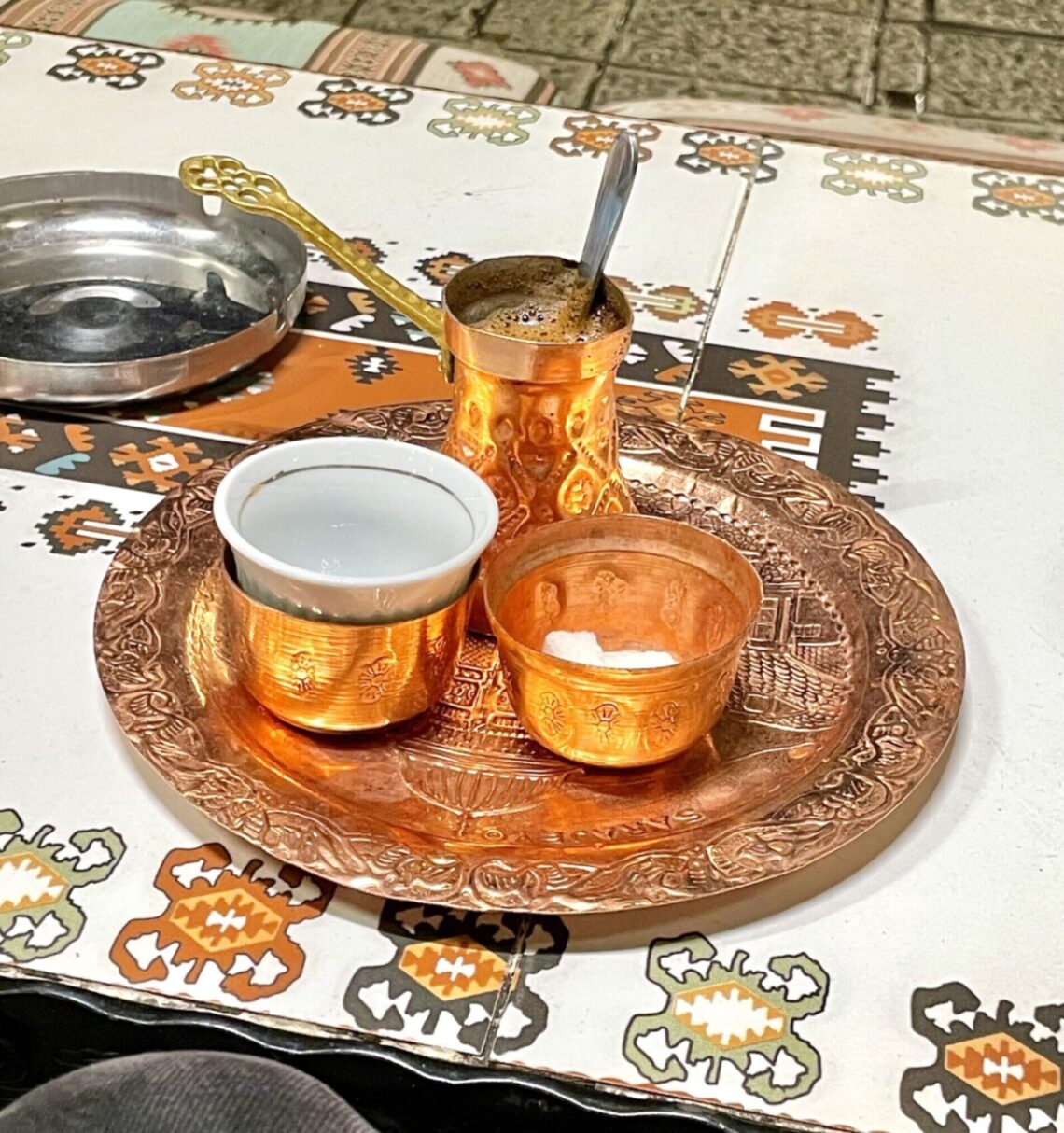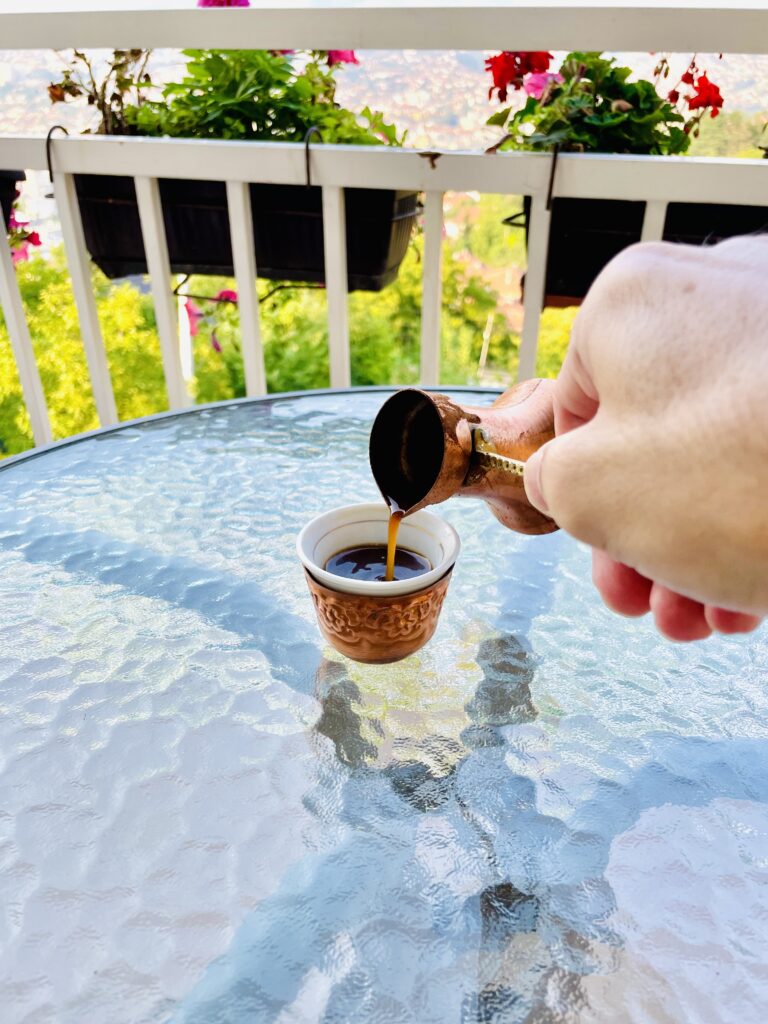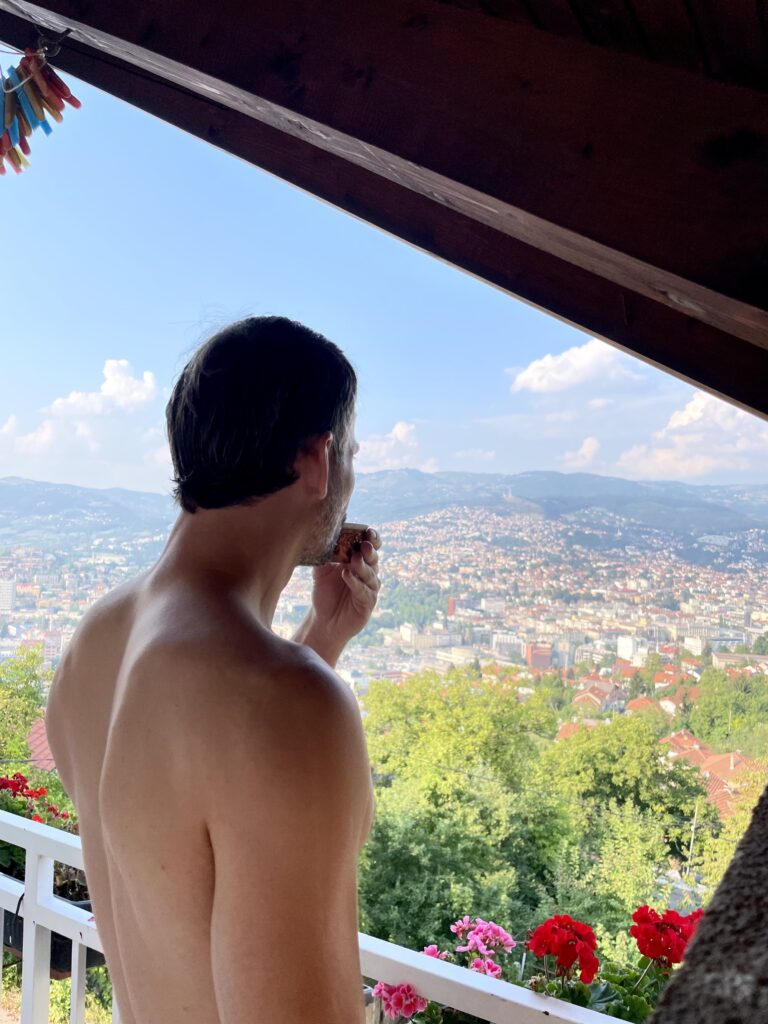
How to make traditional Bosnian coffee: Local Knowledge
- What is traditional Bosnian coffee?
- What’s needed to make traditional Bosnian coffee?
- How to make traditional Bosnian coffee?
- Preparing the pour
- Is sugar used in traditional Bosnian coffee?
- Guide to Sarajevo: Cultural diversity at its finest
What is traditional Bosnian Coffee?
Traditional Bosnian coffee, as taught to me by some really cool locals! Bosnian coffee is brewed by adding fine coffee grounds to boiling water, and served in small cups, called a fildžan. It’s strong, much stronger than that of an Americano. Bosnia and Herzegovina received their introduction to coffee from the Ottoman Empire, a Turkish Empire which ruled most of Southeastern Europe from the 14th century until the early 20th century.
Traditional Bosnian coffee is a social drink, rarely sipped alone. It’s not simply used as a “pick me up” to get through a long day. Drinking coffee in Bosnia is something you often do with others. It’s a big deal! Bosnia and Herzegovina is one of the largest consumers of coffee in the world while being one of the smaller country’s around, so you can imagine the influence. Offering someone a second cup of coffee is a big compliment in Bosnia. Also, the foam! Everyone gets foam in their coffee. If you don’t, well, the server either made an error while brewing or you did something wrong to them!
What’s needed to make traditional Bosnian coffee?
First, you’ll need a mechanism for heating and boiling water. You probably have a stovetop. Good, use this. Second, you’ll need a džezva, or coffee pot, for boiling water. Bosnian coffee cups are called fildžan. The cups are small, like espresso cups, as traditional Bosnian coffee portions are smaller. They are smaller because the strength of coffee is greater, like espresso! You’ll need a fildžan if you’re going for the traditional approach. Next, you’ll need fine coffee grounds and sugar cubes, if you prefer the latter.
How to make traditional Bosnian Coffee?
Let’s get started. We have options here, as I’ve been told by my new Bosnian friends. Fill the džezva (coffee pot) two-thirds full and bring to a boil. Remove the džezva from the burner once the water begins to boil. Now, take a tablespoon of coffee grounds and stir them into the džezva. Place the džezva back on the burner and boil again for 10-20 seconds. The water will quickly start to bubble and foam, be careful not to let it spill over. This can happen quickly so pay attention.
I place half of the džezva on the burner and half off to help prevent a spill over. You can remove the džezva from the burner as necessary to prevent it from boiling over. Vary the amount of coffee grounds used depending on your desired level of strength. I often use a full tablespoon.
Preparing the pour
Now that you’ve boiled the coffee grounds together with water inside of the džezva, remove the pot from the burner. Let it sit for 20-30 seconds. This allows time for cooling and settling of coffee grounds on the bottom of the džezva. Coffee grounds will quickly settle at the bottom of the džezva pot but you can now add a small amount of hot water to the džezva to help filter the grounds thoroughly to the bottom of the pot.
Tip for adding hot water. After boiling the water and prior to adding coffee grounds, pour a small amount of boiled water into your fildžan. Use this hot water to add to your džezva once the coffee has been brewed. This is not necessary but a tip for those who may want a cleaner pour. Now, you’re ready for a pour of freshly brewed Traditional Bosnian coffee. Grab your fildžan!

Is sugar used in traditional Bosnian coffee?
The short answer is yes, sugar is acceptable when brewing traditional Bosnian coffee. You have options with the addition of sugar. For brewing traditional Bosnian coffee, you’ll use sugar cubes.
Option 1: Place desired amount of sugar cubes in your fildžan before pouring the coffee. Pour a small amount of coffee in the fildžan, with sugar cube(s) inside. Allow the hot coffee to blend together with the sugar, then add more coffee to fill your fildžan.
Option 2: Pour the freshly brewed traditional Bosnian coffee into your fildžan without adding sugar. Rather than mixing sugar with coffee inside the fildžan, take a bite from a sugar cube. Now, take a sip of coffee. The coffee and sugar will blend together inside your mouth.
These are the popular methods for including sugar to your traditional Bosnian coffee. I personally prefer option 1. If you elect for option 2, let me know how it goes because I’ve never had it this way! Now, sit back and enjoy your traditional Bosnian coffee!

Take a visit to Bosnia and Herzegovina
Your next adventure can be to take a trip to Bosnia and Herzegovina, where you ought to sample traditional Bosnian coffee with locals. Sarajevo and Mostar are two amazing cities in Bosnia and Herzegovina. There are many other places to explore as well. Sarajevo stole my heart. Hope you are able to visit this charming city and country one day!
Well, you’ve made it to the end of the article. If you find it interesting, please share with others who may enjoy a nice fildžan of traditional Bosnian coffee! Check out some highlights from my trip to Bosnia & Hercegovina along with my traditional Bosnian coffee adventures!
Guide to Sarajevo: Cultural diversity at its finest
If you find yourself wanting to make a visit to Sarajevo, take a look at the article I’ve written about the beautiful and peaceful city. Regardless, I hope simply reading about Sarajevo will broaden your curiosity to travel and experience new cultures! Share your thoughts with me.


4 Comments
Noorah Sharaf
Reminds me of Turkish coffee. Match it with a side of baklava and it’s delicious! Great read and definitely going to try this. Thank you for sharing!
Scott
Hey there, glad you enjoyed! Share with your friends if you feel they may enjoy and yes, certainly try it out! At the very least, its a fun experience. Great idea with the baklava!
Azra Poturak
Hey! So, it actually is almost identical to Turkish coffee. We kept many customs and traditions of our Ottman predecessors.
Scott
This is what I’ve learned! Pretty cool to keep the tradition and culture alive! I believe the only difference is sugar aspect, yeah??